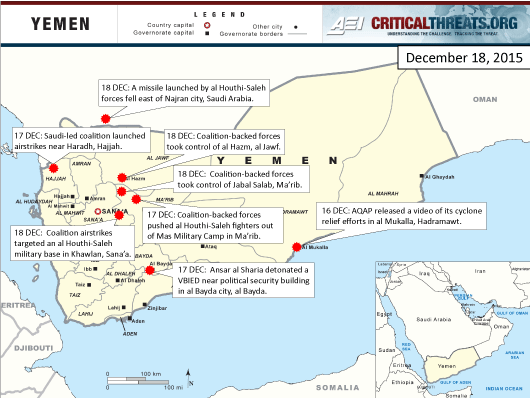Combatants on both sides of the conflict in Yemen continued offensive actions despite the ceasefire, leading the pro-al Houthi delegates to pull out of today’s peace talks in Geneva. The collapse of negotiations will further delay efforts to de-escalate the conflict in Yemen.
The UN-led peace talks in Geneva stalled after both the Saudi-led coalition and the al Houthi-Saleh alliance accused each other of violating the temporary ceasefire. Delegates from the al Houthi movement and the General People’s Congress (GPC) party, headed by former Yemeni president Ali Abdullah Saleh, did not attend UN-led negotiations in Geneva on December 18, citing ceasefire violations by President Abdu Rabbu Mansour Hadi’s coalition-backed government as the cause. The al Houthi-GPC delegates said that they will not resume talks unless the UN condemns the Hadi government’s violations of the ceasefire, which was declared to support the peace process earlier this week. Resumed peace talks would likely remain in the confidence-building stage. Delegates achieved the first of three confidence-building measures on December 17 by agreeing on a plan to facilitate the delivery of humanitarian aid to Taiz city. The remaining two confidence-building measures, which may be more difficult to implement, require the release of political prisoners by the al Houthis and the establishment of a permanent ceasefire. The al Houthis have refused demands to free all political prisoners, including Minister of Defense Mahmoud al Subaihi, President Hadi’s brother Nasr Hadi, and Brig. Gen. Faisal Rajjab, claiming that they will release the detainees after all parties agree to a permanent ceasefire.
Both the al Houthi-Saleh alliance and the Saudi-led coalition and its allies launched offensive actions this week, despite agreeing to a seven-day ceasefire. Clashes continued in al Jawf, Taiz, Shabwah, Ma’rib, and Hajjah governorates following the initiation of the ceasefire on December 15. Yemeni military units loyal to President Hadi and supported by the Saudi-led coalition seized al Hazm, the capital of al Jawf, on December 18 following a weeklong push to take control of the northern Yemeni governorate. Similarly, anti-al Houthi popular resistance forces, likely backed by the coalition, took control of Mas military base in Ma’rib on December 17. The Mas base was the only military base in Ma’rib under al Houthi-Saleh control and its seizure helps secure the Ma’rib- al Jawf road. The Saudi-led coalition partially suspended its airstrike campaign, but airstrikes targeted al Houthi-Saleh forces’ activity near the Saudi-Yemeni border in Hajjah governorate on December 16, likely indicating continued al Houthi-Saleh cross-border attacks in the region. Al Houthi-Saleh forces responded to the coalition-backed offensives by launching two ballistic missiles at coalition targets on December 18. The first, reported to be an OTR-21 Tochka rocket (SS-21 Scarab), targeted a coalition base in Ma’rib governorate but was repelled by coalition missile defenses. The second, a “Qaher 1” missile allegedly modified from an S-75 Dvina (SA-2 Guideline) surface-to-air missile, reportedly fell in the desert east of Najran city in Saudi Arabia. The coalition responded by launching airstrikes on al ‘Arqub military base, located in eastern Sana’a near the Sana’a-Ma’rib border. Coalition-backed forces also seized Jabal Salab in northwestern Ma’rib, a strategic site for control of roads leading into both al Jawf and Sana’a, and claimed to launch incursions into Sana’a governorate on December 18. The uptick in movement by coalition-backed forces may be an attempt to push the al Houthis and their allies to agree to the coalition’s terms, but the occurrence of escalated fighting along established frontlines indicates that the fighting remains deadlocked.
Ansar al Sharia, the insurgent arm of al Qaeda in the Arabian Peninsula (AQAP), continues to exploit the anti-al Houthi fight to strengthen its position in al Bayda governorate. Ansar al Sharia militants detonated a vehicle-borne improvised explosive device near an al Houthi-controlled political security building in al Bayda city on December 17. The protraction of the conflict in Yemen gives Ansar al Sharia the opportunity to continue to leverage the anti-al Houthi fight, building up its military capabilities as well as its relationships with local anti-al Houthi tribes in al Bayda.
AQAP is leveraging its emergency response to last month’s Cyclone Chapala to enhance its legitimacy as a governing force in Hadramawt governorate in eastern Yemen. AQAP released a video on December 16 highlighting the work of its “Rescue Division” before and after the cyclone and showcasing civilians’ positive reactions to aid. The hurricane-strength cyclone struck the eastern Yemeni coast in early November, bringing substantial flooding, displacing more than 40,000 people, and causing dozens of casualties. AQAP, which has governed the coastal city of al Mukalla, Hadramawt, by proxy since April, will continue to release media emphasizing the group’s governmental capabilities in an effort to garner popular support and further entrench itself in the region.
The inability of the major national factions in Yemen to negotiate a more substantive ceasefire and begin talks toward a political settlement reflects the conditions on the ground, in which the al Houthi-Saleh forces remain dominant within their strongholds. The Saudi-led coalition most likely requires a narrative of victory in order to disengage in Yemen, but current events are unlikely to support this narrative. The protraction of the conflict will prolong a security environment that has enabled AQAP to strengthen throughout the country.
James Towey contributed research to this piece.

